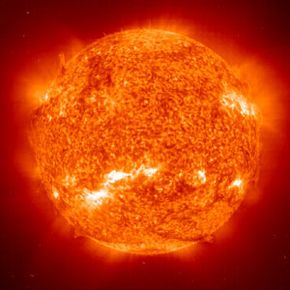A friend’s question spawned the following post:
To understand Einstein’s energy-mass equivalence, It is helpful to check the balance of the units on either side of any equation:
So … E = M x C^2
A joule is a measure of energy which is defined as a (kilogram x meter^2) / second^2
Now let’s look at the units:
Energy’s units: (mass x distance^2) / time^2
And on the other side:
M x C^2 units: mass x (distance/time)^2
Which equates to (mass x distance^2) / time^2
So Einstein’s equation balances insofar as the units are concerned. … a necessary condition. But is it sufficient?
All we know is that the “distance” measure must be really big because a very little mass translates into a huge amount of energy. (The sun has been doing this for billions of years and has billions to go … loosing just a relatively small amount of mass.) Why is this distance how far light travels in a second … 186,000 miles … seems to have been determined heuristically … but I’m not sure?
But it does make for a bit of physics black magic if not the precise number.
STAND UP FOR EINSTEIN!

No comments:
Post a Comment